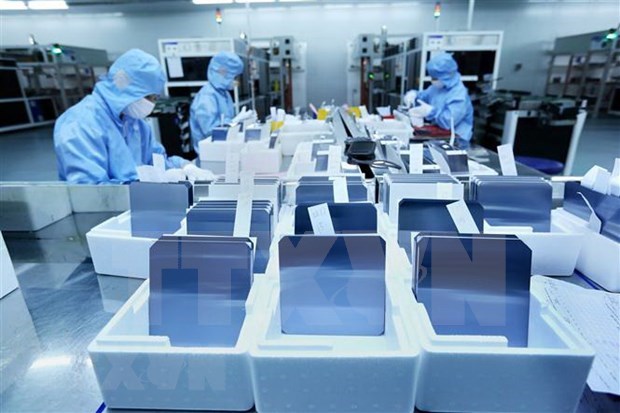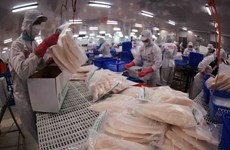Bac Giang to expand industrial parks, cluster to lure more investment
The northern province of Bac Giang plans to focus on developing industrial parks and clusters to welcome a new wave of investment to the locality, according to Director of the provincial Department of Industry and Trade Tran Quang Tan.
 Production at JA Solar Vietnam in Quang Chau industrial park of Bac Giang (Photo:VNA)
Production at JA Solar Vietnam in Quang Chau industrial park of Bac Giang (Photo:VNA)Bac Giang (VNA) – The northern province of Bac Giang plans to focus on developing industrial parks and clusters to welcome a new wave of investment to the locality, according to Director of the provincial Department of Industry and Trade Tran Quang Tan.
Tan said that from now until the end of 2020, the province will prepare necessary conditions, especially in infrastructure and human resources as well as land, in anticipation of foreign investment, especially from multi-national groups.
The province will complete dossiers and submit to the Prime Minister for making decisions on several investment proposals, including a project to build infrastructure for the Vietnam-Republic of Korea industrial park, along with the addition of two industrial-urban-service areas of Yen Son-Bac Lung and Yen Lu into the national master planning on industrial parks development to 2020.
At the same time, Bac Giang will concentrate on speeding up the implementation of projects, especially those on construction of infrastructure in industrial parks and clusters of Hoa Phu, Quang Chau, and Song Khe-Noi Hoang, thus creating a land fund for investment attraction.
Within 2020, the Bac Giang Department of Industrial and Trade will advise the province on the building of planning for industrial parks and clusters, and integrating them into the province’s planning, Tan said.
The official elaborated that in the period from 2021 to 2030, 16 industrial parks will be formed, adding 5,044 hectares to the total area of industrial parks in the province. Meanwhile, 22 industrial clusters will be formed or expanded with total area of 1,321 hectares, making the province ready in terms of “clean” land for receiving investment projects, creating a momentum for economic development.
Bac Giang will also work to ensure that the expansion of industrial parks and clusters is made in association with the protection of security and defence, as well as the protection of ecological environment and food safety.
Meanwhile, industrial areas will have synchronous infrastructure in terms of electricity and water supply, transportation, and telecommunications, along with the construction of urban, service and trade areas as well as housing for workers and other social infrastructure systems such as health care and education.
In industrial parks, the province will encourage companies with high and green technologies in electricity, electronics, telecommunications equipment, precision engineering, and support industry.
In industrial clusters, Bac Giang will call for small and medium-scale projects in production, which use local workers, with priority on projects in food and agricultural product processing.
In the time ahead, Bac Giang will also focus on speeding up the construction of the Bac Giang city logistics centre, thus making it coherent with the development of industrial parks and clusters and optimising the flow of goods and currency, reducing cost and enhancing goods value. This will help improve the supply chain and expand multi-form transportation, enhancing the locality’s attraction to investors.
Currently, Bac Giang has 1,322 hectares of industrial parks and 1,384 hectares of industrial clusters.
The province has attracted 1,269 domestically-invested projects worth over 88 trillion VND (3.79 billion USD at current exchange rate), along with 461 foreign-invested projects with combined capital of more than 6.1 billion USD.
Despite the impacts by the COVID-19 pandemic, in the first six months of 2020, Bac Giang enjoyed a 9.2 percent year-on-year growth in industrial production to 115 trillion VND, fulfilling 41.8 percent of the locality’s target for the whole year.
In the period, production of the State-owned sector grew 10 percent, while that of the non-State sector fell 2.6 percent, and FDI firms rose 11.6 percent. Businesses enjoying increase in production included Fuhong Precision Component with 704 billion VND, Vina Cell Technology with 962 billion VND, and Sjtech VN with 1.16 trillion VND./.













